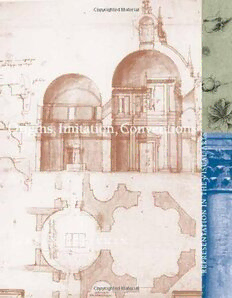Download Origins, imitation, conventions: representation in the visual arts PDF Free - Full Version
Download Origins, imitation, conventions: representation in the visual arts by James S. Ackerman in PDF format completely FREE. No registration required, no payment needed. Get instant access to this valuable resource on PDFdrive.to!
About Origins, imitation, conventions: representation in the visual arts
This collection contains studies written by art historian James Ackerman over the past decade. Whereas Ackerman's earlier work assumed a development of the arts as they responded to social, economic, political, and cultural change, his recent work reflects the poststructural critique of the presumption of progress that characterized Renaissance and modernist history and criticism. In this book he explores the tension between the authority of the past--which may act not only as a restraint but as a challenge and stimulus--and the potentially liberating gift of invention. He examines the ways in which artists and writers on art have related to ancestors and to established modes of representation, as well as to contemporary experiences.The "origins" studied here include the earliest art history and criticism; the beginnings of architectural drawing in the Middle Ages and Renaissance; Leonardo Da Vinci's sketches for churches, the first in the Renaissance to propose supporting domes on sculpted walls and piers; and the first architectural photographs. "Imitation" refers to artistic achievements that in part depended on the imitation of forms established in practices outside the fine arts, such as ancient Roman rhetoric and print media. "Conventions," like language, facilitate communication between the artist and viewer, but are both more universal (understood across cultures) and more fixed (resisting variation that might diminish their clarity). The three categories are closely linked throughout the book, as most acts of representation partake to some degree of all three.
Detailed Information
| Author: | James S. Ackerman |
|---|---|
| Publication Year: | 2002 |
| ISBN: | 9780262011860 |
| Pages: | 343 |
| Language: | English |
| File Size: | 17.168 |
| Format: | |
| Price: | FREE |
Safe & Secure Download - No registration required
Why Choose PDFdrive for Your Free Origins, imitation, conventions: representation in the visual arts Download?
- 100% Free: No hidden fees or subscriptions required for one book every day.
- No Registration: Immediate access is available without creating accounts for one book every day.
- Safe and Secure: Clean downloads without malware or viruses
- Multiple Formats: PDF, MOBI, Mpub,... optimized for all devices
- Educational Resource: Supporting knowledge sharing and learning
Frequently Asked Questions
Is it really free to download Origins, imitation, conventions: representation in the visual arts PDF?
Yes, on https://PDFdrive.to you can download Origins, imitation, conventions: representation in the visual arts by James S. Ackerman completely free. We don't require any payment, subscription, or registration to access this PDF file. For 3 books every day.
How can I read Origins, imitation, conventions: representation in the visual arts on my mobile device?
After downloading Origins, imitation, conventions: representation in the visual arts PDF, you can open it with any PDF reader app on your phone or tablet. We recommend using Adobe Acrobat Reader, Apple Books, or Google Play Books for the best reading experience.
Is this the full version of Origins, imitation, conventions: representation in the visual arts?
Yes, this is the complete PDF version of Origins, imitation, conventions: representation in the visual arts by James S. Ackerman. You will be able to read the entire content as in the printed version without missing any pages.
Is it legal to download Origins, imitation, conventions: representation in the visual arts PDF for free?
https://PDFdrive.to provides links to free educational resources available online. We do not store any files on our servers. Please be aware of copyright laws in your country before downloading.
The materials shared are intended for research, educational, and personal use in accordance with fair use principles.

